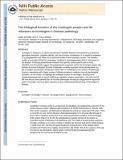The biological function of the Huntingtin protein and its relevance to Huntington’s Disease pathology
Author(s)
Schulte, Joost; Littleton, J. Troy
DownloadLittleton_The biological.pdf (726.3Kb)
OPEN_ACCESS_POLICY
Open Access Policy
Creative Commons Attribution-Noncommercial-Share Alike
Terms of use
Metadata
Show full item recordAbstract
Huntington’s Disease is an adult-onset dominant heritable disorder characterized by progressive psychiatric disruption, cognitive deficits, and loss of motor coordination. It is caused by expansion of a polyglutamine tract within the N-terminal domain of the Huntingtin protein. The mutation confers a toxic gain-of-function phenotype, resulting in neurodegeneration that is most severe in the striatum. Increasing experimental evidence from genetic model systems such as mice, zebrafish, and Drosophila suggest that polyglutamine expansion within the Huntingtin protein also disrupts its normal biological function. Huntingtin is widely expressed during development and has a complex and dynamic distribution within cells. It is predicted to be a protein of pleiotropic function, interacting with a large number of effector proteins to mediate a host of physiological processes. In this review, we highlight the wildtype function of Huntingtin, focusing on its postdevelopmental roles in axonal trafficking, regulation of gene transcription, and cell survival. We then discuss how potential loss-of-function phenotypes resulting in polyglutamine expansion within Huntingtin may have direct relevance to the underlying pathophysiology of Huntington’s Disease.
Description
available in PMC 2011 December 14.
Date issued
2011-01Department
Massachusetts Institute of Technology. Department of Biology; Massachusetts Institute of Technology. Department of Brain and Cognitive Sciences; Picower Institute for Learning and MemoryJournal
Current Trends in Neurology
Publisher
Research Trends
Citation
Schulte, Joost and J. Troy Littleton. "The biological function of the Huntingtin protein and its relevance to Huntington’s Disease pathology." Current Trends in Neurology 5 (2011): 65-78.
Version: Author's final manuscript
ISSN
0972-8252